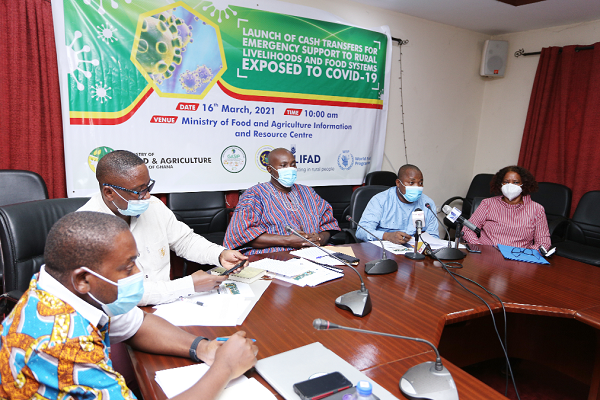The Ministry of Food and Agriculture (MoFA), with support from the World Food Programme (WFP), is to disburse $1.5 million to vulnerable farmers and households in selected regions to cushion them against the devastation caused by the coronavirus disease (COVID-19).
Under the Cash Transfer for Emergency Support to Rural Livelihood and Food Systems Exposed to COVID-19 (ESRF), beneficiaries from the North East, Northern, Savannah, Upper East and Upper West regions have been identified and profiled to receive cash transfer support.
Each beneficiary is expected to receive GH¢1,641.60, the equivalent of $288 at an exchange rate of GH¢5.7 after deduction of expenses.
The WFP is providing funding for the programme, while the Ghana National Household Registry (GNHR) under the Ministry of Gender, Children and Social Protection is the implementing agency.
Launch
At the launch of the programme at the MoFA Resource Centre in Accra yesterday, the National Coordinator of the GNHR, Dr Prosper Laari, said 5,000 individuals would benefit from the relief fund.
He said nine districts in the selected regions with high levels of poverty, malnutrition and food insecurity had been targeted, with the Binduri and Gushegu districts being the smallest and highest beneficiary districts.
Some 235 persons, representing five per cent, and 1,171 persons, representing 23 per cent of the total number are from the Binduri and Gushegu districts respectively.
The rest are Yunyoo-Nasuan, North East Gonja, Bawku-West, Garu-Tempane, Lambussie-Karni, Wa East and Wa West districts, with 19 per cent of the total number being female-headed households.
Payments
Dr Laari said beneficiary households would receive the transfer through their registered mobile money wallets.
The intervention, the coordinator said, was a renewed strategy to help the targeted people survive the impact of the pandemic and also reduce poverty by smoothening consumption and promoting human capital development among extremely poor households in the country.
The eligibility criteria, Dr Laari explained, was derived from the GNHR categorised data of extreme poor, poor and non-poor.
All potential beneficiaries were drawn from the extreme poor category who had already been profiled using a proxy means test, he further explained.
Stakeholder engagement
Dr Laari further called for a stakeholder engagement to set up a single national register to guide the rollout of intervention programmes in the country.
He said a single national register would serve as a database for the selection of beneficiaries for all social protection programmes as well as improve the effectiveness and efficiency of social protection programme delivery.
"Since the outbreak of the pandemic, the GNHR, a unit mandated to create a single national household register of the poor and vulnerable for effective targeting of social protection interventions, had collected and gathered data to help in the implementation of social intervention programmes for the poor and vulnerable in the country," he said.
Assistance
The WFP Country Director, Ms Rukia Yacoub, said following the outbreak of the COVID-19 pandemic, the WFP had extended assistance to the government’s social protection programme to help the extremely poor recover from any negative impact of the pandemic on their livelihoods.
According to her, the WFP was concerned about the millions of people already prone to food insecurity and malnutrition, and who had further slipped down the poverty line as a result of the pandemic.
She said her outfit was working with governments globally to strengthen and expand social protection programmes to address and sustain food production, trade distribution and consumption, and also support national health systems with improved supply chains and nutrition services for the most vulnerable.
Commendation
The acting Chief Director of MoFA, Mr Robert Patrick Ankobia, who launched the programme, said the ESRF would extend support to extremely vulnerable households for a period of three to four months.
He commended the WFP for the gesture and urged beneficiaries of the programme to make good use of the support to improve their lives.

